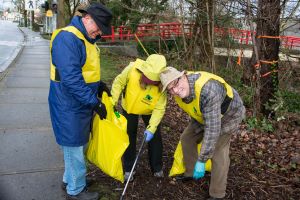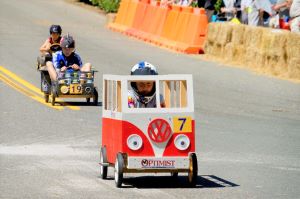From sponsoring water parks for children and their families, running a bathtub race, cleaning up a street, running a soap box derby event, shipping medical equipment to communities in other countries or supplying clean water in Southeast Asia where there is need, the two South Delta Rotary clubs in Ladner and Tsawwassen have generated an estimated total of 13,728 volunteer hours of service among their 130 members in the past year. According to calculations in a special Value of Rotary Volunteering report by Johns Hopkins University’s Center for Civil Society Studies, the monetary value of that time devoted to local, regional and international projects is $308,880 since July 1, 2018.
Tsawwassen Rotary holds an annual Soapbox Derby for kids
 |
| Ladner Rotary Splash Park opened in July 2018 |
 |
| Tsawwassen Rotary holds an annual Bathtub Race in Boundary Bay |
 |
| Ladner Rotary cleans up a stretch of Arthur Drive during the year |
According to the report, Rotary members volunteered a total of 5.8 million hours within a four-week survey period. Extrapolating those results over an entire year, the report gave a conservative estimate of nearly 47 million hours of volunteer effort generated by Rotary members in a typical year.
The report then analyzed the economic impact of all those hours and estimated the value conservatively at $850 million a year, if communities had to pay for the services that Rotary volunteers provide.
Rotary, with the help of Johns Hopkins University, is the first global service organization to conduct an empirical analysis of its volunteers’ impact using an internationally sanctioned definition of volunteer work. The authors of the report noted in their conclusion that at each stop, the analysis had chosen the most conservative estimates.
“This makes the results reported here all the more remarkable,” the authors noted. “Translated into economic terms, Rotary is annually generating a scale of social and economic problem-solving effort that is worth nearly nine times more than it costs the organization to produce.”
Rotary General Secretary John Hewko said the figure doesn't even include the in-kind contributions and the money that Rotary clubs and the Rotary Foundation raise every year. In addition, the figure doesn’t include the volunteer work of the many relatives and friends of Rotary that members often involve in a project, or that of members of Rotaract, Interact, or the Community Corps, that would easily double the estimate of Rotary’s economic impact.
